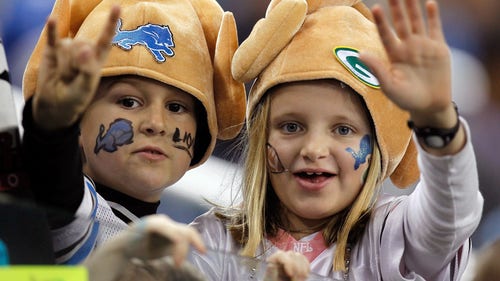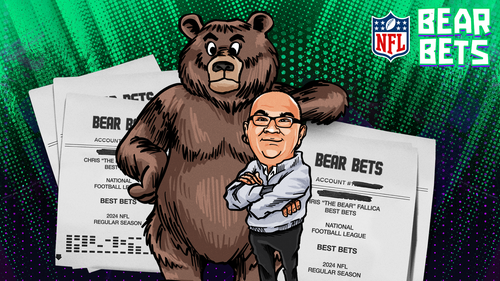
NFL cutdown day is here. A former lineman tells you what it's like
By Geoff Schwartz
FOX Sports NFL Analyst
The end of the NFL preseason brings with it roster cutdowns, as teams are required to trim their rosters from 80 players to 53 by 4 p.m. ET Tuesday — meaning 864 players will lose their jobs with one phone call.
Some of those players will quickly find new homes, while some will never see the field again. It's a rough stretch on the NFL calendar.
I played eight full seasons in the NFL as an offensive lineman. I was released from my contract four times. Each of these times was different, and yet so similar. One minute you have a job and with one phone call, it's gone.
This phone call can happen at set times when players are "prepared," like when rosters need to be trimmed during training camp or right before the start of free agency. They can also occur at random times, like in the winter as you're rehabbing an ankle or during a random spot in training camp. Unfortunately, I've experienced all the typical ways an NFL team will release a player.
In my rookie season, 2008, I was released after the final preseason game with the thought of returning to the Carolina Panthers on their practice squad. The Panthers had told my agent before the final preseason game that I would not be playing because they wanted to "hide me." A lack of film meant it was less likely I had enough snaps to be evaluated by the NFL. That meant I was less likely to clear waivers, a process that players under four seasons of service time must go through before being outright released.
This is a good reminder that roster competition is mostly a myth. Teams have 47 to 50 of the players penciled into the 53-man roster before training camp. Camp is used to prepare the two-deep and find those final roster spots.

Panthers tackles Geoff Schwartz (74), Jeff Otah (79) and Rob Petitti (64) walk to practice during minicamp in 2010. (Photo by Jeff Siner/Charlotte Observer/Tribune News Service via Getty Images)
The morning after that final preseason game, I was woken up at 6 a.m. and told I was being released. Even knowing this call was coming, it was still jarring. I knew the Panthers wanted me on the practice squad but nothing is guaranteed in the NFL. Maybe the team had found another player around the league to fill that spot.
I was drafted by the Panthers in the seventh round in 2008 and had just spent months in Charlotte. I understood thinking about a life there was short-sighted, but I did it anyway. I had met my future wife already, and that phone call had me doubting my future in Carolina. There was also a chance I could be claimed by another team and have to pack my bags, immediately leave for my new city and live out of a suitcase again. None of that happened, as I cleared waivers and the Panthers signed me to the practice squad.
Entering my fourth season in the NFL, I was so pumped about the prospect of a long-term extension in Charlotte. I had started 19 straight games, and 20 of the starting 22 players had long-term deals. Those plans were dashed when I got injured and missed the 2011 season.
Because I was on the practice squad in Year 1, I was a restricted free agent after my fourth season. The Panthers had the right to offer me a tender, and I was under the impression they would do so. I was naive.
The general manager told my agent at the combine that the Panthers weren't offering me a tender and I was being let go. That one stung, and it was the first time I realized the NFL is a business. Every single player has that moment, whether he believes it will happen or not.
This release, for lack of a better description, was not kind to my life plans. I had settled in Charlotte and was engaged, with plans to play there my entire career. I had told my fiancée this would be our life. So much for that!
Looking back, it was always foolish to plan a life in a city without a future contract. But it's difficult to be pessimistic about your future when you're playing well.

The Giants were the fourth NFL team for guard Geoff Schwartz, who played two seasons in New York. (Photo by Rich Kane/Icon Sportswire/Corbis/Icon Sportswire via Getty Images)
In 2014, after stops in Minnesota and Kansas City, I signed a four-year contract with the New York Giants. I immediately got injured and played only two games during my first season in New York. My second season started well, as I played the first 10 games before being injured in the 11th. After another ankle surgery, I planned on returning for my third season in New York. I had assumed the Giants would ask me to take another pay cut, as I did after my first season, and I would continue to rehab to return in 2016.
Instead, I received a call in early February from Jerry Reese, the Giants' general manager at the time. I needed to fly to New York for my official release. This one stung for two reasons. First, I felt regret because of my injuries. It felt unfair. I'd suffered three major injuries in two seasons. All three of them happened during a game. It was just bad luck. My wife and I had a young son, and she was pregnant with our second child, and now we had to pack up our life in New York.
The second reason this release bothered me was the lack of transparency from the Giants. I asked multiple times for a reason why I was being released. I felt after seven seasons in the league I deserved to know. Was it because of poor play, injuries or both? Give me something. They refused to speak to me. I did not get to meet with any coaches or front office staff, which is rare when being released.
I signed with the Lions after the Giants. Entering the third preseason game in 2016, I was the backup for both guard spots and right tackle if a starter got hurt. I knew that if I didn't play in the first half with the starters, I would get a full second half, which I needed. I had not played in the second preseason game and I knew there were concerns about my ankle, so playing a full half was very important for me.
At halftime in Baltimore, I was preparing to enter the game — going through my mental checklist, making sure I was taped up and loose. My offensive line coach pulled me aside and said I was "down" for the second half. No playing time for me. I was crushed. I wanted to play, but more than anything, I knew what this meant.
I was being released.
After we got settled on the sidelines to begin the second half, I walked over to my offensive line coach and asked him directly: "Am I being cut tomorrow?" His answer: "It doesn't look good." We both knew I was gone.
The next morning, the call came in. I will always give credit to Lions general manager Bob Quinn and head coach Jim Caldwell for having a frank conversation with me about my release in their office. We spoke for 10 minutes, and while I didn't know it at the time, that was the last time I'd be in an NFL building. I drove immediately to my rented apartment, packed my stuff and went home.
While I knew that season would be my last in the league, I wanted to end it on the field. Instead, my NFL career ended like so many others: a quick phone call, turn in the playbook and move on to the rest of your life.
This is a zero-sum game. This week, 864 players will go through the same thing I did as part of this year's cutdown process. I can only hope they made the most of their time in the league, and that their teams are as transparent and kind as possible.
Geoff Schwartz played eight seasons in the NFL for five different teams. He started at right tackle for the University of Oregon for three seasons and was a second-team All-Pac-12 selection his senior year. He is an NFL analyst for FOX Sports. Follow him on Twitter @GeoffSchwartz.










